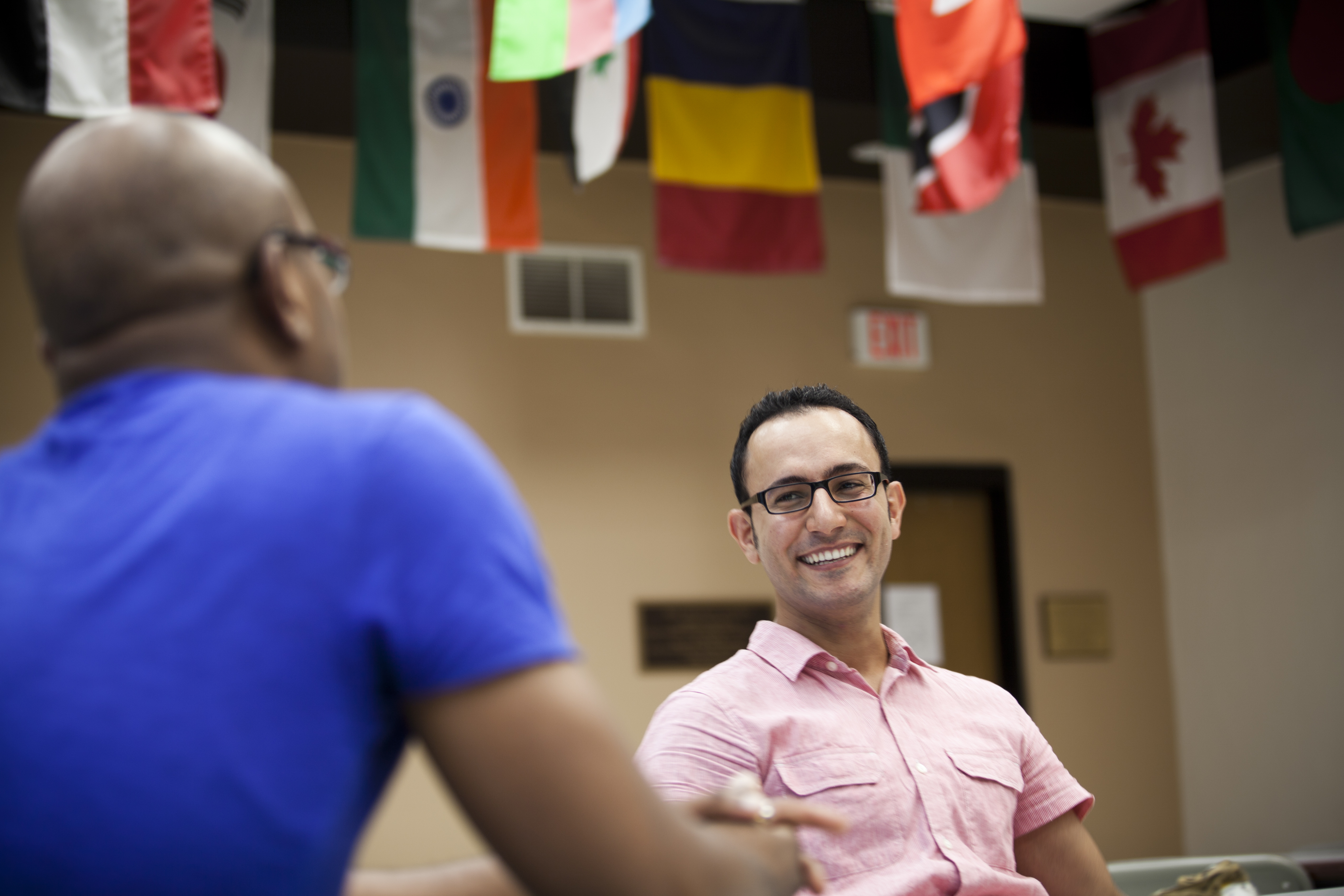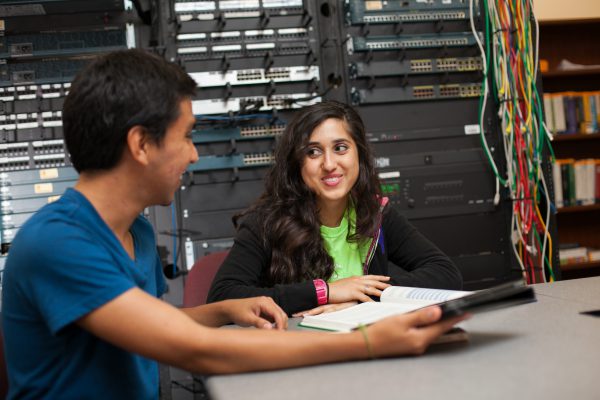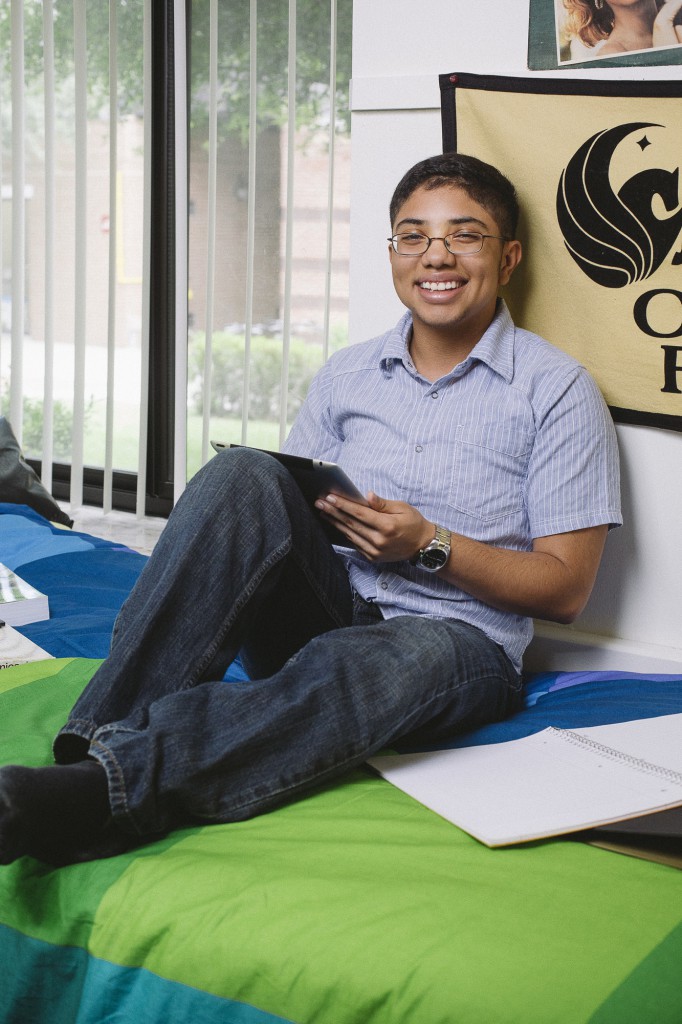Employment is defined as any work performed or service rendered for money, tuition, fees, supplies, room, food, or any other benefit. International students with an F-1 or J-1 visa are eligible for certain types of employment in the United States. It is the responsibility of the student to ensure the type of employment they plan to begin is considered “authorized” or legal. To avoid the negative consequences of falling out of status for engaging in illegal employment, students are encouraged to review the following information and always consult with a UCF Global Immigration Advisor prior to beginning any employment.
ON-CAMPUS EMPLOYMENT
Students maintaining their F-1 or J-1 status are generally permitted to work on UCF’s premises. This type of employment is “incidental to status.” Employment is limited to a total of 20 hours per week during the fall and spring semesters. During the summer semester and over winter break, students may work more than 20 hours per week on-campus.
F-1 STUDENTS
F-1 students do not require additional employment authorization from a UCF Global Immigration Advisor to work on-campus.
J-1 STUDENTS
J-1 students must receive written approval from their UCF Global Immigration Advisor and have the on-campus employment entered on their SEVIS record prior to beginning on-campus employment. To request on-campus employment authorization, provide a copy of your on-campus employment offer letter which includes the following information to your UCF Global Immigration Advisor:
- Name of on-campus employer
- Employer’s physical address (no P.O. Box)
- Number of hours per week
- Employment start and end dates
- Title and nature of the job
- Supervisor name, telephone, and signature
ON-CAMPUS EMPLOYMENT IS LIMITED TO THE FOLLOWING OPTIONS
Work on university premises, employed by UCF
Examples include:
- Teaching and research assistants,
- Work in the libraries and administrative offices
Work on university premises, employed by an on-campus commercial company
This type of job must be directly related to student services, such as:
- UCF Bookstore
- UCF Dining Services
- Restaurants or coffee shops on-campus
Work done at off-campus locations but considered as on-campus
This includes work at an off-campus location that is educationally associated with the school. The student must be employed by UCF.
F-1 CURRICULAR PRACTICAL TRAINING (CPT)
Curricular Practical Training (CPT) is a temporary employment authorization benefit extended to F-1 students in degree-granting programs to gain practical experience that is directly related to their field of study prior to graduation. Eligibility for CPT must first be determined by a UCF Global Immigration Advisor and then authorized in SEVIS prior to students beginning employment. Upon authorization for CPT, students are provided an updated I-20 with the CPT authorization listed on page 2 of the I-20. Working without prior CPT authorization or beyond the dates listed on the CPT authorization on the I-20 is a violation of F-1 status and will result in the loss of F-1 status.

ELIGIBILITY FOR CPT
- Must be in valid F-1 status to apply for CPT.
- Must have been enrolled full-time for at least one academic year in a degree-granting program immediately preceding the CPT on the same SEVIS record.
- An academic year is defined as both a fall and a spring semester. Summer semester does not count toward the academic year requirement.
- The academic year requirement must be at the same degree level, except in the case of undergraduate students who transferred directly to UCF after completion of an Associate’s degree (such as through DirectConnect to UCF).
- Semesters of enrollment with an approved Reduced Course Load count toward the academic year requirement.
- Continuous enrollment in another visa status or in another degree program at the same academic level may also count toward this requirement upon review by a UCF Global Immigration Advisor.
- Students must be in a degree-granting program. UCF Global English Programs such as the Intensive English Program and the Global Achievement Academy programs are not eligible.
- CPT employment must be off-campus and not considered on-campus employment. (Exceptions may be reviewed on a case-by-case basis).
- Employment must be an integral part of the student’s curriculum and directly related to the student’s primary field of study. You may either enroll in a required internship or practicum course through your major academic department or be academically recommended to enroll in Experiential Learning’s internship course. If the internship opportunity is not required, the student must receive credit for the training.
UCF Global makes the final determination of eligibility for CPT. Refer to the CPT Application Packet for additional information.

HOW TO APPLY FOR CPT
To apply for CPT, students must download the CPT Application Packet and follow the instructions on the form to fully complete the application, obtain the necessary recommendation(s), enroll in the internship course, and submit the application and job offer letter to UCF Global. Students may not begin working until the CPT start date listed on the I-20 issued by UCF Global.
CPT DEADLINES
Since CPT is curricular in nature and tied to enrollment in an internship, practicum, or Experiential Learning course, CPT is authorized on a semester-by-semester basis only.
Students are encouraged to apply early! UCF Global does not guarantee same-day processing for CPT applications. Refer to the table for application timeframes. Students pursuing a required internship should connect with their department for departmental deadlines and any additional paperwork, if applicable.
Students who have specific questions about their eligibility for CPT after reviewing the CPT Application Packet encouraged to schedule an appointment with a UCF Global Immigration Advisor.
| Semester | Earliest Internship Start Date | Class Begins | Last Day to Apply (Graduate Students) | Last Day to Apply (Undergraduate Students) | Last Day to End CPT (Final Semester) | Last Day to End (Continuing Students) |
|---|---|---|---|---|---|---|
| Spring 2026 | Dec. 29, 2025 | Jan. 12, 2026 | Jan. 16, 2026 | Jan. 23, 2026 | May 8, 2026 | May 12, 2026 |
| Spring G 2026 | Feb. 23, 2026 | Mar. 9, 2026 | Mar. 13, 2026 | Mar. 13, 2026 | May 8, 2026 | May 12, 2026 |
| Summer 2026 | Apr. 29, 2026 | May 13, 2026 | May 19, 2026 | May 26, 2026 | Aug. 1, 2026 | Aug. 23, 2026 |
| Summer B 2026 | Jun. 10, 2026 | Jun. 24, 2026 | Jun. 30, 2026 | Jun. 30, 2026 | Aug. 1, 2026 | Aug. 23, 2026 |
| Fall 2026 | Aug. 10, 2026 | Aug. 24, 2026 | Aug. 28, 2026 | Sep. 4, 2026 | Dec. 11, 2026 | Jan. 10, 2027 |
| Fall G 2026 | Oct. 5, 2026 | Oct. 19. 2026 | Oct. 23, 2026 | Oct. 23, 2026 | Dec. 11, 2026 | Jan. 10, 2027 |
F-1 OPTIONAL PRACTICAL TRAINING (OPT)
Optional Practical Training (OPT) is a temporary employment benefit available for F-1 students who have been maintaining immigration status. Its purpose is to give students the opportunity to work off-campus and gain work experience in a field directly related to the student’s course of study. Employment is limited to a total of twelve months for each higher degree level and may be granted before or after completion of studies. Eligibility for OPT must first be determined by a UCF Global Immigration Advisor. If eligible, an OPT recommendation is then entered on the student’s Form I-20 and submitted as part of an application packet to US Citizenship and Immigration Services (USCIS) for adjudication.

ELIGIBILITY FOR OPT
- Students must be in valid F-1 status at the time of the application.
- Students must have been enrolled on a full-time basis for one academic year before applying
- Graduate students registered in thesis or dissertation hours may apply and engage in Post-Completion OPT prior to graduation on the basis of completing all program requirements with the exception of the thesis or dissertation
- Students are eligible for one year of OPT per higher education level. This means students may apply for one year of OPT for the bachelor’s level, one year for the master’s level, and one year for the doctoral level. (UCF Global English Programs such as the Intensive English Program and Global Achievement Academy are not eligible for OPT.)
Students may apply up to 90 days prior to graduation. The application must be received by USCIS no later than 60 days after program completion.
To apply for OPT, please self-enroll and complete the OPT Webcourse and follow the instructions in the WebCourse to submit the OPT Request Form to UCF Global online.
F-1 STEM EXTENSION OF OPT
The STEM Extension of Optional Practical Training (OPT) is a 24-month extension of Post-Completion Optional Practical Training (OPT). A STEM extension is available to F-1 students who are currently on post-completion OPT, have earned a qualifying degree in the fields of Science, Technology, Engineering, or Mathematics (STEM) whose employment meets additional requirements.
To learn more about the STEM Extension and for step-by-step instructions on how to apply, please self-enroll in the STEM OPT Workshop.
J-1 ACADEMIC TRAINING

Academic Training is a type of off-campus employment authorization available for J-1 students to gain work experience within their field of study. Academic training requests must be evaluated and authorized by a UCF Global immigration advisor prior to students beginning employment.
THERE ARE TWO TYPES OF ACADEMIC TRAINING STUDENTS MAY CHOOSE FROM:
- Pre-completion. Grants employment eligibility prior to completion of degree
- Post-Completion. Grants employment eligibility after completion of degree
EMPLOYMENT TIME LIMITATIONS
- Undergraduate and Master’s level students are eligible for a maximum period of 18 months.
- Doctoral students are eligible for a maximum period of 36 months. Students may only apply for 18 months of academic training at a time.
- Students pursuing academic programs that are shorter than 18 months may only be allowed employment up to the length of the program.
- Completion of more than one degree program does not increase the academic training time period.
- Part-time academic training counts toward the total allowable days of academic training.
For apply for Academic Training, complete the Academic Training Authorization Request and submit it to a UCF Global Immigration Advisor along with the required documentation listed on the form. For questions regarding Academic Training eligibility, please consult with a UCF Global Immigration Advisor.
F-1 EMPLOYMENT BASED ON SEVERE ECONOMIC HARDSHIP
F-1 students who are experiencing severe economic hardship due to unforeseen changes in their financial circumstances after they arrived to the United States may be eligible to apply to the United States Citizenship and Immigration Services (USCIS) for authorization to work off-campus.
EXAMPLES OF UNFORSEEN CIRCUMSTANCES
- Loss of financial support or on-campus employment without fault on the part of the student
- Substantial changes in the exchange rate or value of currency
- Inordinate increases in tuition or living costs
- Unexpected changes in the financial state of the student’s sponsor
- Medical bills
- Other substantial and unexpected expenses
Economic hardship employment is designed to allow the student to work off-campus for 20 hours per week while school is in session and full-time during vacation periods. Employment does not need to be related to the student’s course of study and no offer of employment is needed to apply for this type of employment authorization. Employment authorization is granted for periods of 1 year at a time and authorization ends if the student graduates, transfers to another institution, or fails to maintain status.
ECONOMIC HARDSHIP ELIGIBILITY
- Must have been in F-1 status for one academic year (fall and spring semester)
- Must be in good academic standing
- Must be enrolled full-time
- Must demonstrate that the employment will not interfere with student’s ability to maintain full-time enrollment
- Must document that employment is necessary to avoid severe economic hardship due to unforeseen circumstances beyond the student’s control
- Must document that on-campus employment opportunities are unavailable or insufficient to meet the student’s financial needs
To apply for Economic Hardship employment, students must review the Severe Economic Hardship Application Checklist and make an appointment with a UCF Global immigration advisor.
SOCIAL SECURITY NUMBER (SSN)
A Social Security Number (SSN) is a permanent nine-digit number that is used issued by the U.S. Government and is needed to facilitate payment for scholarships, employment in the U.S., and to file a U.S. tax return.
ELIGIBILITY FOR A SOCIAL SECURITY NUMBER
In order to be eligible for a Social Security Number (SSN) international students must:
- Have an on-campus job offer or be authorized for CPT, OPT, or Academic Training, and
- Have an active SEVIS record
Students who are not eligible for an SSN may need to apply for an Individual Taxpayer Identification Number (ITIN) for the purposes of tax treaties and filing taxes.
HOW TO APPLY FOR A SSN
International Students must apply for a SSN in-person at the local Social Security Administration Office. Download the Social Security Number Checklist for a complete list of required documents and additional information.

AFTER APPLYING FOR A SSN
After applying in-person at the Social Security Administration Office, students will receive a Social Security Card containing their SSN in the mail within 2-6 weeks of the date of application. It is very important to sign the card, memorize the SSN, and keep it in a safe, secure place (i.e. not your wallet or purse). The SSN is a very sensitive number that can be used to open bank accounts and credit cards among many other things. It is important to keep the number safe and secure to prevent identity theft. Students working on-campus at UCF must provide UCF their SSN to facilitate payroll and taxes.
